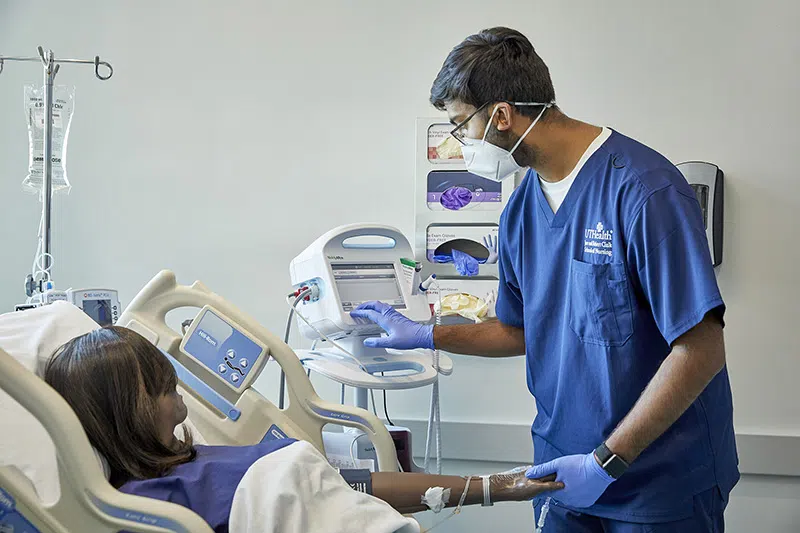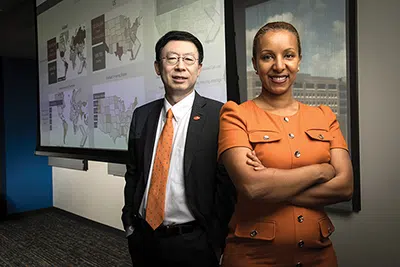PhD Public Seminar: SHAO-HSI (PAUL) HUNG
When & Where
September 3, 2025
1:30 PM - 2:30 PM
UTHH-MD Anderson Cancer Center, SCR1.1025 and via Zoom ( View in Google Map)
Contact
- Joy A. Lademora
- 7135009872
- [email protected]
Event Description
Advancing T Cell–Based Immunotherapies: Identification of Tumor-Specific T Cell Receptor Targets and Mechanisms of Resistance in Solid Tumors
Shao-Hsi (Paul) Hung, BS (Advisor: Cassian Yee, MD)
Cancer immunotherapies, such as adoptive cell therapy, have transformed cancer treatment by eliciting durable immune responses. While adoptive cell therapy has demonstrated remarkable success in hematologic malignancies and several solid tumors, most patients with solid tumors either fail to respond or eventually relapse. This limited efficacy is partly due to the absence of optimal target antigens and the development of tumor-intrinsic immune resistance mechanisms that enable evasion of immune surveillance. Overcoming these challenges will be critical to enhance the effectiveness of cancer immunotherapies and improve patient outcomes.
Anaplastic thyroid cancer (ATC) is one of the most aggressive solid tumors, with a median survival of six months. Although 30-40% of the patients harbor BRAF mutations, which are initially responsive to BRAF inhibitors, most eventually develop resistance and relapse. Patients with resistant disease or lacking BRAF mutations have limited treatment options, highlighting the urgent need for novel therapeutic strategies and target discovery. To address this, we employed an immunopeptidomics-guided antigen discovery approach, coupled with an endogenous T cell generation protocol, to identify novel immunogenic, tumor-associated peptide epitopes and validate their immunogenicity. Through this strategy, we identified an HLA-A*24:02–restricted epitope derived from PDZ-binding kinase (PBK), a serine/threonine kinase involved in cell proliferation and recognized as an ATC-specific marker. We successfully generated PBK-specific cytotoxic T lymphocytes (CTLs) and PBK-specific TCR-T cells that selectively recognized tumor cells presenting this epitope but not proliferating normal cells. Their antitumor functionality was further validated in an orthotopic ATC mouse model as well as across multiple solid tumor types. These findings advance TCR-based cellular therapies with the potential to improve outcomes for patients with rare or common malignancies.
To identify novel tumor-intrinsic factors that regulate T cell–mediated immune responses, we leveraged an in vivo customized CRISPR/Cas9 dropout screen using a non-small cell lung cancer model. This screen revealed proteasome subunit alpha 7 (PSMA7), a core component of the 20S proteasome, as a critical immune regulator. PSMA7 is overexpressed across multiple cancer types, and its upregulation leads to poor prognosis. We discovered that loss of PSMA7 in tumor cells can sensitize their susceptibility to T cell-mediated cytotoxicity both in vitro and in the NSG mouse model. Mechanistically, PSMA7-ablated tumors enhance tumor-associated antigen presentation and potentially reshape the immunopeptidome, thereby increasing tumor immunogenicity.
In summary, these efforts have not only expanded the repertoire of targetable antigens for T cell therapy but also uncovered novel immune regulators whose deletion enhances tumor-associated antigen presentation. Together, these findings offer promising translational potential for improving cancer immunotherapy.
Advisory Committee:
- Cassian Yee, MD, Chair
- Yejing Ge, PhD
- Stephen Lai, MD, PhD
- Mauro Di Pilato, PhD
- Wenyi Peng, MD, PhD
- Dihua Yu, MD, PhD
Join via Zoom (Please contact Mr. Hung for his zoom meeting info)
Advancing T Cell–Based Immunotherapies: Identification of Tumor-Specific T Cell Receptor Targets and Mechanisms of Resistance in Solid Tumors
Shao-Hsi (Paul) Hung, BS (Advisor: Cassian Yee, MD)
Cancer immunotherapies, such as adoptive cell therapy, have transformed cancer treatment by eliciting durable immune responses. While adoptive cell therapy has demonstrated remarkable success in hematologic malignancies and several solid tumors, most patients with solid tumors either fail to respond or eventually relapse. This limited efficacy is partly due to the absence of optimal target antigens and the development of tumor-intrinsic immune resistance mechanisms that enable evasion of immune surveillance. Overcoming these challenges will be critical to enhance the effectiveness of cancer immunotherapies and improve patient outcomes.
Anaplastic thyroid cancer (ATC) is one of the most aggressive solid tumors, with a median survival of six months. Although 30-40% of the patients harbor BRAF mutations, which are initially responsive to BRAF inhibitors, most eventually develop resistance and relapse. Patients with resistant disease or lacking BRAF mutations have limited treatment options, highlighting the urgent need for novel therapeutic strategies and target discovery. To address this, we employed an immunopeptidomics-guided antigen discovery approach, coupled with an endogenous T cell generation protocol, to identify novel immunogenic, tumor-associated peptide epitopes and validate their immunogenicity. Through this strategy, we identified an HLA-A*24:02–restricted epitope derived from PDZ-binding kinase (PBK), a serine/threonine kinase involved in cell proliferation and recognized as an ATC-specific marker. We successfully generated PBK-specific cytotoxic T lymphocytes (CTLs) and PBK-specific TCR-T cells that selectively recognized tumor cells presenting this epitope but not proliferating normal cells. Their antitumor functionality was further validated in an orthotopic ATC mouse model as well as across multiple solid tumor types. These findings advance TCR-based cellular therapies with the potential to improve outcomes for patients with rare or common malignancies.
To identify novel tumor-intrinsic factors that regulate T cell–mediated immune responses, we leveraged an in vivo customized CRISPR/Cas9 dropout screen using a non-small cell lung cancer model. This screen revealed proteasome subunit alpha 7 (PSMA7), a core component of the 20S proteasome, as a critical immune regulator. PSMA7 is overexpressed across multiple cancer types, and its upregulation leads to poor prognosis. We discovered that loss of PSMA7 in tumor cells can sensitize their susceptibility to T cell-mediated cytotoxicity both in vitro and in the NSG mouse model. Mechanistically, PSMA7-ablated tumors enhance tumor-associated antigen presentation and potentially reshape the immunopeptidome, thereby increasing tumor immunogenicity.
In summary, these efforts have not only expanded the repertoire of targetable antigens for T cell therapy but also uncovered novel immune regulators whose deletion enhances tumor-associated antigen presentation. Together, these findings offer promising translational potential for improving cancer immunotherapy.
Advisory Committee:
- Cassian Yee, MD, Chair
- Yejing Ge, PhD
- Stephen Lai, MD, PhD
- Mauro Di Pilato, PhD
- Wenyi Peng, MD, PhD
- Dihua Yu, MD, PhD
Join via Zoom (Please contact Mr. Hung for his zoom meeting info)
\n\n", "startDate":"2025-9-3", "endDate":"2025-9-3", "startTime":"13:30", "endTime":"14:30", "location":"UTHH-MD Anderson Cancer Center, SCR1.1025 and via Zoom", "label":"Add to Calendar", "options":[ "Apple", "Google", "iCal", "Microsoft365", "MicrosoftTeams", "Yahoo" ], "timeZone":"America/Chicago", "trigger":"click", "inline":true, "listStyle":"modal", "iCalFileName":"Reminder-Event" }








